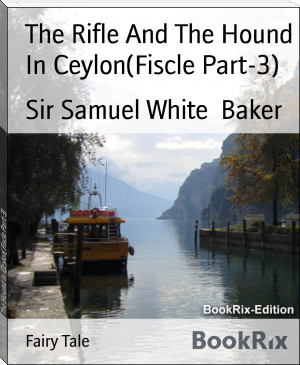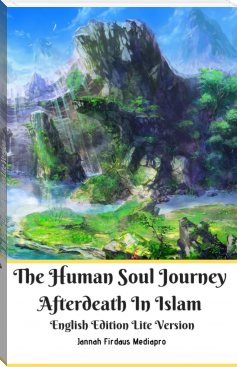The Rifle And The Hound In Ceylon(Fiscle Part-3), Sir Samuel White Baker [most inspirational books .txt] 📗

- Author: Sir Samuel White Baker
Book online «The Rifle And The Hound In Ceylon(Fiscle Part-3), Sir Samuel White Baker [most inspirational books .txt] 📗». Author Sir Samuel White Baker
Fell To The Shot, One Of Which Was A Fawn; The Ball Had Passed Through
The Shoulder Of The Mother, And Had Broken The Fawn's Neck Upon The
Opposite Side. I Am Astonished That This Chance Of Killing Two At One
Shot Does Not More Often Happen When The Dense Body Of A Herd Of Deer Is
Exposed To A Rifle-Ball.
Deer-Stalking Is One Of The Most Exciting Sports In The World. I Have
Often Crept Upon Hands And Knees For Upwards Of A Quarter Of A Mile
Through Mud And Grass To Get A Shot At A Fine Antlered Buck. It
Frequently Happens That After A Long Stalk In This Manner, When Some
Sheltering Object Is Reached Which You Have Determined Upon For The
Shot, Just As You Raise Your Head Above The Grass In Expectation Of
Seeing The Game, You Find A Blank. He Has Watched Your Progress By The
Nose, Although The Danger Was Hidden From His View, And Your Trouble Is
Unrewarded.
In All Wild Shooting, In Every Country And Climate, The `Wind' Is The
First Consideration. If You Hunt Down Wind You Will Never Get A Deer.
You Will Have Occasional Glimpses Of Your Game, Who Will Be Gazing
Intently At You At Great Distances Long Before You Can See Them, But You
Will Never Get A Decent Shot. The Great Excitement And Pleasure Of All
Sport Consists In A Thorough Knowledge Of The Pursuit. When The Dew Is
Heavy Upon The Ground At Break Of Day, You Are Strolling Noiselessly
Along With The Rifle, Scanning The Wide Plains And Searching The Banks
Of The Pools And Streams For Foot-Marks Of The Spotted Deer. Upon
Discovering The Tracks Their Date Is Immediately Known, The Vicinity Of
The Game Is Surmised, The Tracks Are Followed Up, And The Herd Is At
Length Discovered. The Wind Is Observed; Dry Leaves Crumbled Into Powder
And Let Fall From The Hand Detect The Direction If The Slightest Air Is
Stirring, And The Approach Is Made Accordingly. Every Stone, Every Bush
Or Tree Or Tuft Of Grass, Is Noted As A Cover For An Advance, And The
Body Being Kept In A Direct Line With Each Of These Objects, You
Approach Upon Hands And Knees From Each Successive Place Of Shelter Till
A Proper Distance Is Gained. The Stalking Is The Most Exciting Sport In
The World. I Have Frequently Heard My Own Heart Beat While Creeping Up
To A Deer. He Is An Animal Of Wonderful Acuteness, And Possessing The
Keenest Scent; He Is Always On The Alert, Watching For Danger From His
Stealthy Foe The Leopard, Who Is A Perfect Deer-Stalker.
To Kill Spotted Deer Well, If They Are Tolerably Wild, A Person Must Be
A Really Good Rifle Shot, Otherwise Wise He Will Wound Many, But Seldom
Bag One. They Are Wonderfully Fast, And Their Bounding Pace Makes Them
Extremely Difficult To Hit While Running. Even When Standing They Must
Be Struck Either Through The Head, Neck, Or Shoulder, Or They Will
Rarely Be Killed On The Spot; In Any Other Part, If Wounded, They Will
Escape As Though Untouched, And Die A Miserable Death In Solitude.
In Narrating Long Shots That I Have Made, I Recount Them As Bright
Moments In The Hours Of Sport; They Are The Exceptions And Not The Rule.
I Consider A Man A First-Rate Shot Who Can Always Bag His Deer Standing
At Eighty Yards, Or Running At Fifty. Hitting And Bagging Are Widely
Different. If A Man Can Always Bag At The Distance That I Have Named He
Will Constantly Hit, And Frequently Bag, At Extraordinary Ranges, As
There Is No Doubt Of His Shooting, And, When He Misses, The Ball Has
Whizzed Somewhere Very Close To The Object; The Chances Are, Therefore,
In Favour Of The Rifle.
The Deer Differ In Character In Various Parts Of Ceylon. In Some Places
Where They Are Rarely Disturbed They Can Be Approached To Within Thirty
Or Forty Paces, In Which Case A Very Moderate Shot Can Easily Kill Them;
But It Is Better Sport When They Are Moderately Wild. The Greatest
Number Of Deer That I Ever Saw Was In The South-Eastern Part Of Ceylon,
In The Neighbourhood Of Pontane And Yalle. The Whole Of This Country Is
Almost Uninhabited, And Accordingly Undisturbed. Yalle Is The Nearest
Town Of Importance, From Which A Good Road, Lined On Either Side With
Cocoa-Nut And Bread-Fruit Trees, Extends As Far As Tangalle, Fifty
Part 3 Chapter 7 Pg 55Miles. A Few Miles Beyond This Village The Wild Country Begins, And
Hambantotte Is The Next Station, Nearly Ninety Miles From Yalle. The
Country Around Hambantotte Is Absolutely Frightful-Wide Extending Plains
Of White Sand And Low Scrubby Bushes Scattered Here And There; Salt
Lakes Of Great Extent, And Miserable Plains Of Scanty Herbage,
Surrounded By Dense Thorny Jungles. Notwithstanding This, At Some
Seasons The Whole District Is Alive With Game. January And February Are
The Best Months For Elephants And Buffaloes, And August And September
Are The Best Seasons For Deer, At Which Time The Whole Country Is Burnt
Up With Drought, And The Game Is Forced To The Vicinity Of Yalle River
And The Neighbouring Pools. In The Wet Season This District Is Nearly
Flooded, And Forms A Succession Of Deep Marshes, The Malaria From Which
Is Extremely Unhealthy. At This Time The Grass Is High, And The
Elephants Are Very Numerous.
When I Was In This Part Of The Country The Drought Was Excessive; The
Jungle Was Parched, And The Leaves Dropped From The Bushes Under The
Influence Of A Burning Sun. Not A Cloud Ever Appeared Upon The Sky, But
A Dazzling Haze Of Intense Heat Spread Over The Scorched Plains. The
Smaller Streams Were Completely Dried Up, And The Large Rivers Were
Reduced To Rivulets In The Midst Of A Bed Of Sand.
The Whole Of This Country Is A Succession Of Flat Sandy Plains And Low
Jungles Contiguous To The Sea-Coast. The Intense Heat And The Glare Of
The Sun Rendered The Journey Most Fatiguing. I At Length Descried A Long
Line Of Noble Forest In The Distance, And This I Conjectured To Be Near
The River, Which Turned Out To Be The Case; We Were Soon Relieved From
The Burning Sun By The Shade Of As Splendid A Forest As I Have Ever
Seen. A Few Hundred Yards From The Spot At Which We Had Entered, Yalle
River Rolled Along In A Clear Stream. In The Wet Season This Is A Rapid
Torrent Of About 150 Yards In Width, But At This Time The Bed Of The
River Was Dry, With The Exception Of A Stream Of About Thirty Paces
Broad, Which Ran Directly Beneath The Bank We Were Descending.
An Unexpected Scene Now Presented Itself. The Wide Bed Of The River Was
Shaded On Either Side By Groves Of Immense Trees, Whose Branches
Stretched Far Over The Channel; And Not Only Beneath Their Shade, But In
Every Direction, Tents Formed Of Talipot Leaves Were Pitched, And A
Thousand Men, Women, And Children Lay Grouped Together; Some Were
Bathing In The River, Some Were Sitting Round Their Fires Cooking A
Scanty Meal, Others Lay Asleep Upon The Sand, But All Appeared To Be
Congregated Together For One Purpose; And So Various Were The Castes And
Costumes That Every Nation Of The East Seemed To Have Sent A
Representative. This Was The Season For The Annual Offerings To The
Kattregam God, To Whose Temple These Pilgrims Were Flocking, And They
Had Made The Dry Bed Of Valle River Their Temporary Halting-Place. A Few
Days After, No Less Than 18,000 Pilgrims Congregated At Kattregam.
I Was At This Time Shooting With My Friend, Mr. H. Walters, Then Of The
15th Regiment. We Waded Up The Bed Of The River For About A Mile, And
Then Pitched The Tent Under Some Fine Trees In The Open Forest. Several
Wild Buffaloes Were Drinking In The River Within A Short Distance Of Us;
But Thinking This A Likely Spot For Elephants, We Determined Not To
Disturb The Neighbourhood By Firing A Shot Until We Had First Explored
The Country. After A Walk Of A Couple Of Hours Through Fine Open Forest
And Small Bushy Plains, We Came To The Conclusion That There Were Very
Few Elephants In The Country, And We Devoted Ourselves To Other Game.
After A Day Or Two Spent In Killing Deer, A Few Wild Buffaloes, And Only
One Elephant, I Felt Convinced That We Should Never Find The Latter, In
The Dry State Of The Country, Unless By Watching At Some Tank At Night.
We Therefore Moved Our Encampment Inland About Twenty-Five Miles From
Yalle. Here There Is A Large Tank, Which I Concluded Would Be The Resort
Of Elephants.
A Long Day's Journey Through A Burning Sun Brought Us To Sitrawelle.
This Is A Small Village, About Six Miles Inward From The Sea-Coast
Village Of Kesinde. Here The Natives Brought Us Plantains And Buffalo
Milk, While We Took Shelter From The Sun Under A Splendid Tamarind Tree.
Opposite To This Was A 'Bo'-Tree; *(Very Similar To The Banian-Tree)
This Grew To An Extraordinary Size; The Wide Spreading Branches Covered
About Half An Acre Of Ground, And The Trunk Measured Upwards Of Forty
Feet In Circumference. The Tamarind-Tree Was Nearly The Same Size; And I
Never Saw Together Two Such Magnificent Specimens Of Vegetation. A Few
Paces From This Spot, A Lake Of About Four Miles' Circuit Lay In The
Centre Of A Plain; This Was Surrounded By Open Forests And Jungles, All
Of Which Looked Like Good Covers For Game. Skirting The Opposite Banks
Of The Lake, We Pitched The Tent Under Some Shady Trees Upon A Fine
Level Sward. By This Time It Was Nearly Dusk, And I Had Barely Time To
Stroll Out And Kill A Peacock For Dinner Before Night Set In.
The Next Morning, Having Been Joined By My Friend, Mr. P. Braybrook,
Then Government Agent Of This District, Our Party Was Increased To
Three, And Seeing No Traces Of Elephants In This Neighbourhood, We
Determined To Proceed To A Place Called Wihare-Welle, About Six Miles
Farther Inland.
Our Route Now Lay Along A Broad Causeway Of Solid Masonry. On Either
Side Of This Road, Stone Pillars Of About Twelve Feet In Height Stood In
Broken, Rows, And Lay Scattered In Every Direction Through The Jungle.
Ruined Dagobas And Temples Jutted Their Rugged Summits Above The
Tree-Tops, And Many Lines Of Stone Columns Stood In Parallel Rows, The
Ancient Supports Of Buildings Of A Similar Character To Those Of
Pollanarua And Anarajahpoora. We Were Among The Ruins Of Ancient
Mahagam. One Of The Ruined Buildings Had Apparently Rested Upon
Seventy-Two Pillars. These Were Still Erect, Standing In Six Lines Of
Twelve Columns; Every Stone Appeared To Be About Fourteen Feet High By
Two Feet Square And Twenty-Five Feet Apart. This Building Must Therefore
Have Formed An Oblong Of 300 Feet By 150. Many Of The Granite Blocks
Were Covered With Rough Carving; Large Flights Of Steps, Now Irregular
From The Inequality Of The Ground, Were Scattered Here And There; And
The General Appearance Of The Ruins Was Similar To That Of Pollanarua,
But Of Smaller Extent. The Stone Causeway Which Passed Through The Ruins
Was About Two Miles In Length, Being For The Most Part Overgrown With
Low Jungle And Prickly Cactus. I Traversed The Jungle For Some Distance
Until Arrested By The Impervious Nature Of The Bushes; But Wherever I
Went, The Ground Was Stewed With Squared Stones And Fallen Brickwork





Comments (0)